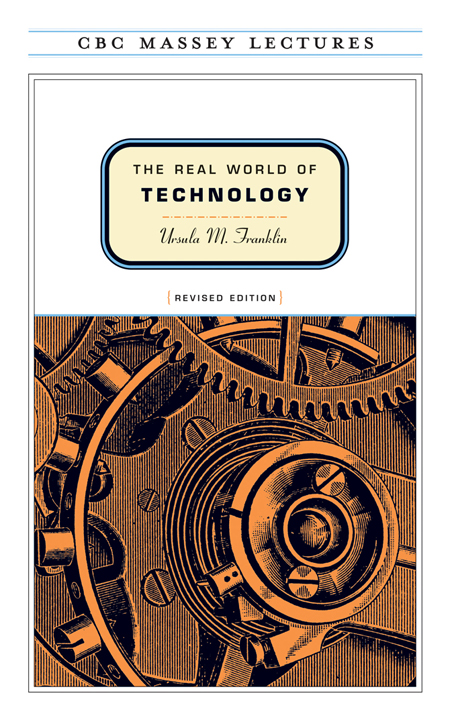Ursula Franklin: The Real World of Technology (1990–)
Filed under book | Tags: · labour, machine, society, technology, time

“In her 1989 CBC Massey Lectures, renowned scientist and humanitarian Ursula M. Franklin examines the social and political effects of technology. For her, technology is much more than machines, gadgets or electronic transmitters. It is a comprehensive system that includes methods, procedures, organization, “and most of all, a mindset”. She distinguishes between holistic technologies used by craft workers or artisans and prescriptive ones associated with a division of labour in large-scale production. Holistic technologies allow artisans to control their own work from start to finish. Prescriptive technologies organize work as a sequence of steps requiring supervision by bosses or managers. Franklin argues that the dominance of prescriptive technologies in modern society discourages critical thinking and promotes “a culture of compliance”.
The revised edition features four added chapters, in which Franklin tackles issues such as the dilution of privacy and intellectual property rights, the impact of the current technology on government and governance, the shift from consumer capitalism to investment capitalism, and the influence of the Internet upon the craft of writing.
Franklin acknowledges her intellectual debt to Jacques Ellul, Lewis Mumford, C.B. Macpherson, E. F. Schumacher and Vandana Shiva, among others.”
Publisher CBC Enterprises, Montréal, 1990
ISBN 0887943756
132 pages
Revised edition
Publisher House of Anansi Press, Toronto, 1999
ISBN 088784636X, 9780887846366
xii+209 pages
via seasounds, in the Unlimited Edition
Publisher (1999)
WorldCat (1999)
PDF (1990, 4 MB, added on 2021-2-27)
EPUB (rev.ed., 1999)
Audio recording
Matthew Wisnioski: Engineers for Change: Competing Visions of Technology in 1960s America (2012)
Filed under book | Tags: · 1960s, 1970s, activism, computing, education, engineering, history of computing, history of technology, labour, luddism, military, science, space, technology

“In the late 1960s an eclectic group of engineers joined the antiwar and civil rights activists of the time in agitating for change. The engineers were fighting to remake their profession, challenging their fellow engineers to embrace a more humane vision of technology. In Engineers for Change, Matthew Wisnioski offers an account of this conflict within engineering, linking it to deep-seated assumptions about technology and American life.
The postwar period in America saw a near-utopian belief in technology’s beneficence. Beginning in the mid-1960s, however, society—influenced by the antitechnology writings of such thinkers as Jacques Ellul and Lewis Mumford—began to view technology in a more negative light. Engineers themselves were seen as conformist organization men propping up the military-industrial complex. A dissident minority of engineers offered critiques of their profession that appropriated concepts from technology’s critics. These dissidents were criticized in turn by conservatives who regarded them as countercultural Luddites. And yet, as Wisnioski shows, the radical minority spurred the professional elite to promote a new understanding of technology as a rapidly accelerating force that our institutions are ill-equipped to handle. The negative consequences of technology spring from its very nature—and not from engineering’s failures. “Sociotechnologists” were recruited to help society adjust to its technology. Wisnioski argues that in responding to the challenges posed by critics within their profession, engineers in the 1960s helped shape our dominant contemporary understanding of technological change as the driver of history.”
Publisher MIT Press, 2012
ISBN 0262018268, 9780262018265
296 pages
via a2
Interview with the author (Carla Nappi, New Books in Science, Technology, and Society, audio, 1h)
Review (Caroll Pursell, The American Historical Review, 2014)
Review (Kevin T. Baker, The Sixties, 2013)
Review (Stephen H. Unger, 2013)
Damian F. White: Bookchin. A Critical Appraisal (2008)
Filed under book | Tags: · anarchism, critical theory, deep ecology, democracy, ecology, environmental ethics, marxism, participation, philosophy, political ecology, social theory, urban planning

This is the first comprehensive overview of the work of Murray Bookchin, the left-libertarian social theorist and political ecologist who is widely regarded as the visionary precursor of anti-corporate politics. Bookchin’s writing spans fifty years and engages with a wide variety of issues: from ecology to urban planning, from environmental ethics to debates about radical democracy. Weaving insights from Hegel and Marx, Kropotkin and Mumford, Bookchin presents a critical theory whose central utopian message is ‘things could be other than they are’. This accessible introduction maps the evolution of Bookchin’s project. It traces his controversial engagements with Marxism, anarchism, critical theory, postmodernism and eco-centric thought. It evaluates his attempt to develop a social ecology. Finally, it considers how his thinking relates to current debates in social theory and environmentalism, critical theory and philosophy, political ecology and urban theory. Offering a clear account of Bookchin’s key themes, this book provides a critical but sympathetic account of the strengths and weaknesses of Bookchin’s writing.
Publisher Pluto Press, 2008
Original from the University of Michigan
Digitized Jul 17, 2009
ISBN 0745319645, 9780745319643
Length 236 pages
More info (publisher)
More info (google books)

